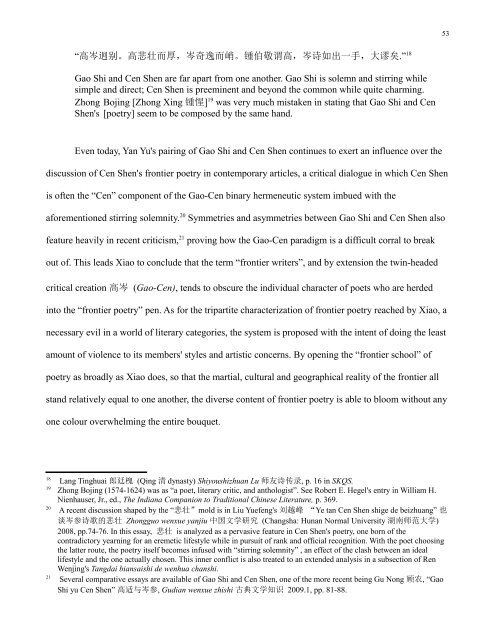View/Open - University of Victoria
View/Open - University of Victoria
View/Open - University of Victoria
You also want an ePaper? Increase the reach of your titles
YUMPU automatically turns print PDFs into web optimized ePapers that Google loves.
53<br />
“ 高 岑 迥 别 。 高 悲 壮 而 厚 , 岑 奇 逸 而 峭 。 锺 伯 敬 谓 高 , 岑 诗 如 出 一 手 , 大 谬 矣 .” 18<br />
Gao Shi and Cen Shen are far apart from one another. Gao Shi is solemn and stirring while<br />
simple and direct; Cen Shen is preeminent and beyond the common while quite charming.<br />
Zhong Bojing [Zhong Xing 锺 惺 ] 19 was very much mistaken in stating that Gao Shi and Cen<br />
Shen's [poetry] seem to be composed by the same hand.<br />
Even today, Yan Yu's pairing <strong>of</strong> Gao Shi and Cen Shen continues to exert an influence over the<br />
discussion <strong>of</strong> Cen Shen's frontier poetry in contemporary articles, a critical dialogue in which Cen Shen<br />
is <strong>of</strong>ten the “Cen” component <strong>of</strong> the Gao-Cen binary hermeneutic system imbued with the<br />
aforementioned stirring solemnity. 20 Symmetries and asymmetries between Gao Shi and Cen Shen also<br />
feature heavily in recent criticism, 21 proving how the Gao-Cen paradigm is a difficult corral to break<br />
out <strong>of</strong>. This leads Xiao to conclude that the term “frontier writers”, and by extension the twin-headed<br />
critical creation 高 岑 (Gao-Cen), tends to obscure the individual character <strong>of</strong> poets who are herded<br />
into the “frontier poetry” pen. As for the tripartite characterization <strong>of</strong> frontier poetry reached by Xiao, a<br />
necessary evil in a world <strong>of</strong> literary categories, the system is proposed with the intent <strong>of</strong> doing the least<br />
amount <strong>of</strong> violence to its members' styles and artistic concerns. By opening the “frontier school” <strong>of</strong><br />
poetry as broadly as Xiao does, so that the martial, cultural and geographical reality <strong>of</strong> the frontier all<br />
stand relatively equal to one another, the diverse content <strong>of</strong> frontier poetry is able to bloom without any<br />
one colour overwhelming the entire bouquet.<br />
18<br />
Lang Tinghuai 郎 廷 槐 (Qing 清 dynasty) Shiyoushizhuan Lu 师 友 诗 传 录 , p. 16 in SKQS.<br />
19<br />
Zhong Bojing (1574-1624) was as “a poet, literary critic, and anthologist”. See Robert E. Hegel's entry in William H.<br />
Nienhauser, Jr., ed., The Indiana Companion to Traditional Chinese Literature, p. 369.<br />
20<br />
A recent discussion shaped by the “ 悲 壮 ”mold is in Liu Yuefeng's 刘 越 峰 “Ye tan Cen Shen shige de beizhuang” 也<br />
谈 岑 参 诗 歌 的 悲 壮 Zhongguo wenxue yanjiu 中 国 文 学 研 究 (Changsha: Hunan Normal <strong>University</strong> 湖 南 师 范 大 学 )<br />
2008, pp.74-76. In this essay, 悲 壮 is analyzed as a pervasive feature in Cen Shen's poetry, one born <strong>of</strong> the<br />
contradictory yearning for an eremetic lifestyle while in pursuit <strong>of</strong> rank and <strong>of</strong>ficial recognition. With the poet choosing<br />
the latter route, the poetry itself becomes infused with “stirring solemnity” , an effect <strong>of</strong> the clash between an ideal<br />
lifestyle and the one actually chosen. This inner conflict is also treated to an extended analysis in a subsection <strong>of</strong> Ren<br />
Wenjing's Tangdai biansaishi de wenhua chanshi.<br />
21<br />
Several comparative essays are available <strong>of</strong> Gao Shi and Cen Shen, one <strong>of</strong> the more recent being Gu Nong 顾 农 , “Gao<br />
Shi yu Cen Shen” 高 适 与 岑 参 , Gudian wenxue zhishi 古 典 文 学 知 识 2009.1, pp. 81-88.
















